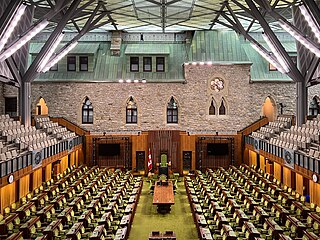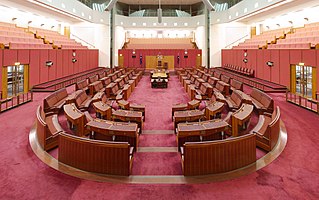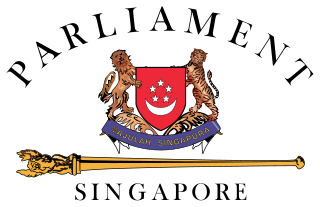
The House of Commons is the lower house of the Parliament of the United Kingdom. Like the upper house, the House of Lords, it meets in the Palace of Westminster in London, England. The House of Commons is an elected body consisting of 650 members known as members of Parliament (MPs). MPs are elected to represent constituencies by the first-past-the-post system and hold their seats until Parliament is dissolved.

The House of Commons of Canada is the lower house of the Parliament of Canada. Together with the Crown and the Senate of Canada, they comprise the bicameral legislature of Canada.
A whip is an official of a political party whose task is to ensure party discipline in a legislature. This means ensuring that members of the party vote according to the party platform, rather than according to their own individual ideology or the will of their donors or constituents. Whips are the party's "enforcers". They work to ensure that their fellow political party legislators attend voting sessions and vote according to their party's official policy. Members who vote against party policy may "lose the whip", being effectively expelled from the party.
The Canadian University Society for Intercollegiate Debate is the national organization which governs all English language competitive university debating and public speaking in Canada. It sanctions several official annual tournaments and represents Canadian debating domestically and abroad. Its membership consists of student debating unions, sanctioned by their respective universities, from across Canada. CUSID has been described as "a student-run, parliamentary debate league with close ties to the American Parliamentary Debate Association".

The Speaker of the House of Commons is the presiding officer of the House of Commons, the lower house and primary chamber of the Parliament of the United Kingdom. The current speaker, Sir Lindsay Hoyle, was elected Speaker on 4 November 2019, following the retirement of John Bercow. Hoyle began his first full parliamentary term in the role on 17 December 2019, having been unanimously re-elected after the 2019 general election.

Debate is a process that involves formal discourse, discussion, and oral addresses on a particular topic or collection of topics, often with a moderator and an audience. In a debate, arguments are put forward for common opposing viewpoints. Debates have historically occurred in public meetings, academic institutions, debate halls, coffeehouses, competitions, and legislative assemblies. Debates have also been conducted for educational and recreational purposes, usually associated with educational establishments and debating societies. These debates emphasized logical consistency, factual accuracy, and emotional appeal to an audience. Modern forms of competitive debate also include rules for participants to discuss and decide upon the framework of the debates.

The House of Representatives is the sole chamber of the New Zealand Parliament. The House passes laws, provides ministers to form Cabinet, and supervises the work of government. It is also responsible for adopting the state's budgets and approving the state's accounts.

In some parliamentary systems, politicians are said to cross the floor if they formally change their political affiliation to a political party different from the one they were initially elected under. In Australia though, this term simply refers to Members of Parliament (MPs) who dissent from the party line and vote against the express instructions of the party whip while retaining membership in their political party.
Congressional Debate is a competitive interscholastic high school debate event in the United States. The National Speech and Debate Association (NSDA), National Catholic Forensic League (NCFL) and many state associations and national invitational tournaments offer Congressional Debate as an event. Each organization and tournament offers its own rules, although the National Speech and Debate Association has championed standardization since 2007, when it began to ask its districts to use one of a number of procedures for qualification to its National Tournament.
The American Parliamentary Debate Association (APDA) is the oldest intercollegiate parliamentary debating association in the United States. APDA sponsors over 50 tournaments a year, all in a parliamentary format, as well as a national championship in late April. It also administers the North American Debating Championship with the Canadian University Society for Intercollegiate Debate (CUSID) every year in January. Although it is mainly funded by its member universities, APDA is an entirely student-run organization.
The National Parliamentary Debate Association (NPDA) is one of the two national intercollegiate parliamentary debate organizations in the United States. The other is the American Parliamentary Debate Association. Its membership is national with participating schools throughout the country. In 2015, NPDA was the largest debating organization in the United States with around 200-250 participating schools in any given year.
Parliamentary style debate, colloquially oftentimes just Parliamentary debate, is a formal framework for debate used in debating societies, academic debate events and competitive debate. It has its roots in parliamentary procedure and develops differently in different countries as a result.

The Parliament of Singapore is the unicameral legislature of the Republic of Singapore, which governs the country alongside the president of Singapore. Largely based upon the Westminster system, the Parliament is made up of Members of Parliament (MPs) who are elected, as well as Non-constituency Members of Parliament (NCMPs) and Nominated Members of Parliament (NMPs) who are appointed. Following the 2020 general election, 93 MPs and two NCMPs from three political parties were elected to the 14th Parliament. Throughout the sitting of Parliament, nine NMPs are usually appointed by the president on a biennial basis.
In competitive debate, most commonly in the World Schools, Karl Popper, and British Parliamentary debate styles, a point of information (POI) is when a member of the team opposing that of the current speaker gets to briefly interrupt the current speaker, offering a POI in the form of a question or a statement. This may be as a correction, asking for clarity, or just a plain question. As in some debating styles, such as World Schools Style, they often may not be offered in the first or last minute of any speech, or during reply speeches. Points of information may never be offered to a member of the same team.
World Schools Style debating is a combination of the British Parliamentary and Australia-Asian debating formats, designed to meet the needs of the World Schools Debating Championships tournament. Each debate comprises eight speeches delivered by two teams of three members, representing the Proposition and Opposition sides. The first six speeches are eight minutes in duration, with each team then finishing up by giving a four-minute concluding reply speech. Teams are given 30 to 60 minutes to prepare for their speeches.
In the Parliament of Malaysia, the political parties appoint party whips to ensure party discipline, help manage legislative business and carry out a variety of other functions on behalf of the party leadership. The most important function of a government party whip is to ensure that sufficient number of members and senators are present to take part in voting in the chamber, to maintain a parliamentary quorum and to prevent censure motions succeeding. Their roles in the chamber include taking divisions, and arranging pairs which affect the ability of members and senators to leave parliament during sittings, as well as the entitlement to be absent during divisions.
Australia–Asia Debate, sometimes referred to as Australasian Debating or Australs Style, is a form of academic debate. In the past few years, this style of debating has increased in usage dramatically throughout both Australia and the Asian region, but in the case of Asian countries including Singapore, Malaysia, and the Philippines, the format is also used alongside the British Parliamentary Format. The context in which the Australia-Asia style of debate is used varies, but it is commonly used in Australia at the primary and secondary school level, ranging from small informal one-off intra-school debates to larger more formal inter-school competitions with several rounds and a finals series which occur over a year. It is also commonly used at university level.
Public debate may mean simply debating by the public, or in public. The term is also used for a particular formal style of debate in a competitive or educational context. Two teams of two compete through six rounds of argument, giving persuasive speeches on a particular topic.

The 1993 confidence motion in the second Major ministry was an explicit confidence motion in the Conservative government of John Major. It was proposed in order to ensure support in the British Parliament for the passing of the Maastricht Treaty. Due to previous defeats caused when Eurosceptic Conservative MPs voted with the opposition, the Government had to obtain support for its policy on the Social Chapter before the European Communities Amendment Act 1993 could come into effect and allow the United Kingdom to ratify the treaty. Dissenting Conservative MPs were willing to vote against the Government, but had to come into line on a confidence motion or else lose the Conservative whip. Only one eurosceptic MP was deliberately absent; and as a result, the motion passed by 40 votes and the United Kingdom ratified the Maastricht Treaty.
The United Kingdom has an uncodified constitution. The constitution consists of legislation, common law, Crown prerogative and constitutional conventions. Conventions may be written or unwritten. They are principles of behaviour which are not legally enforceable, but form part of the constitution by being enforced on a political, professional or personal level. Written conventions can be found in the Ministerial Code, Cabinet Manual, Guide to Judicial Conduct, Erskine May and even legislation. Unwritten conventions exist by virtue of long-practice or may be referenced in other documents such as the Lascelles Principles.







